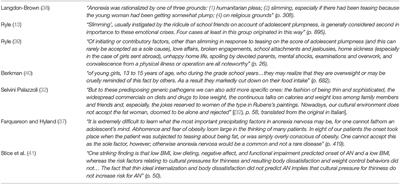EDITORIAL
Published on 28 May 2021
Editorial: Toward an Improved Understanding of Severe and Enduring Anorexia Nervosa
doi 10.3389/fpsyt.2021.698194
- 1,712 views
- 6 citations
21k
Total downloads
125k
Total views and downloads
EDITORIAL
Published on 28 May 2021
PERSPECTIVE
Published on 11 Mar 2021

REVIEW
Published on 15 Feb 2021

ORIGINAL RESEARCH
Published on 08 Jan 2021

PERSPECTIVE
Published on 21 Oct 2020
BRIEF RESEARCH REPORT
Published on 28 Aug 2020

ORIGINAL RESEARCH
Published on 22 Jul 2020

ORIGINAL RESEARCH
Published on 07 Jul 2020

ORIGINAL RESEARCH
Published on 12 Jun 2020

ORIGINAL RESEARCH
Published on 12 May 2020

MINI REVIEW
Published on 17 Apr 2020

MINI REVIEW
Published on 24 Mar 2020
